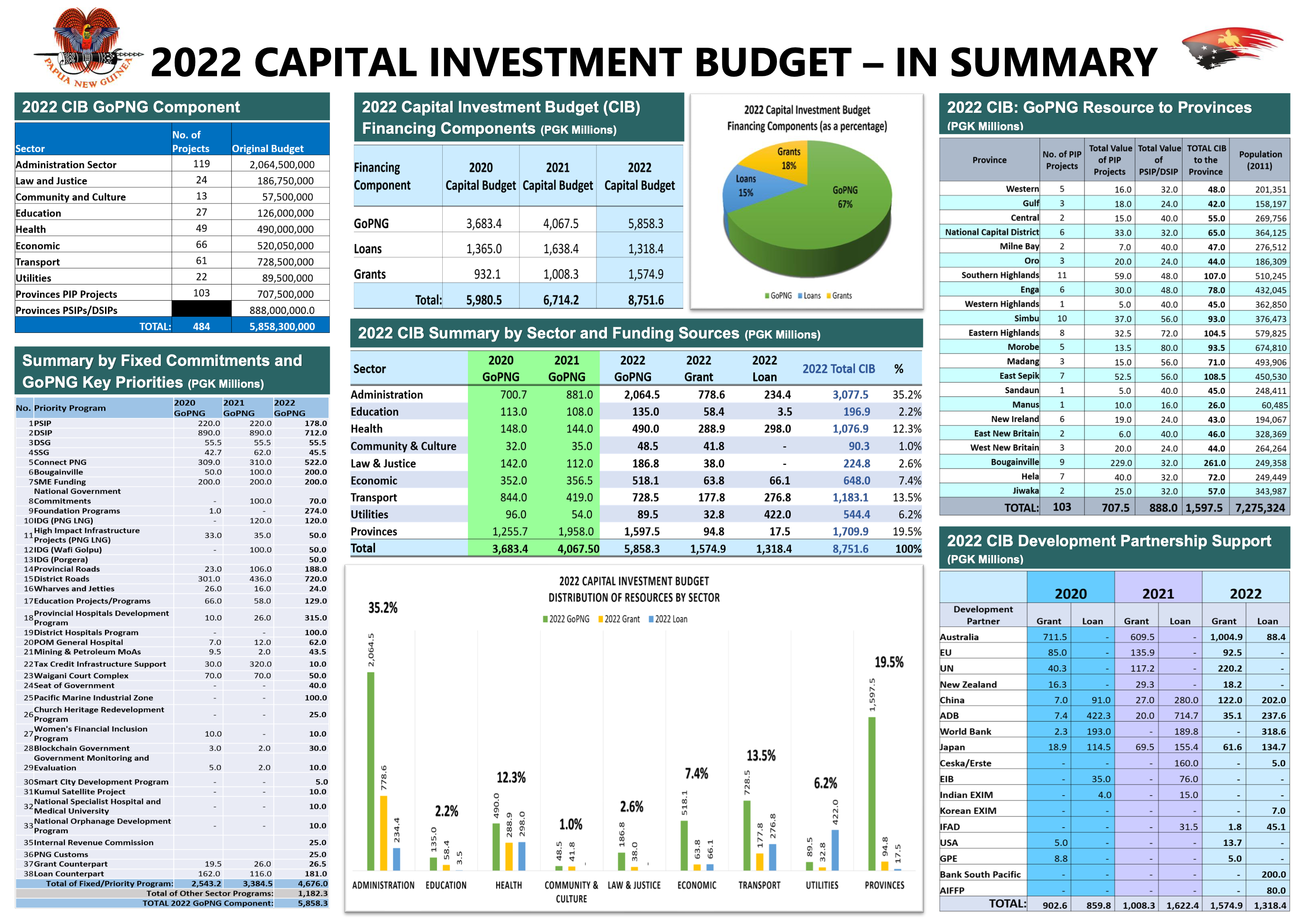The 2030 Agenda for Sustainable Development
Papua New Guinea (PNG) adopted the 2030 Agenda for Sustainable Development and the Small Island Developing States Accelerated Modalities of Action (SAMOA Pathway) to achieve the country's Vision 2050. The Sustainable Development Goals (SDGs) were integrated into the Medium Term Development Plan IV (2018-2022) with other national policies, legislations and budgets. Progress has been a mixture for thematic areas of some key sectors due to internal and/or external pressures. This first Voluntary National Review (VNR) Report provides progress of implementation and rejuvenates PNG's ownership of the SDGs.

Since 2000, notable progress was made in Health (Goal 4), Education (Goal 5), Climate Action (SDG 13), and Partnership for the Goals (SDG 17):
• maternal mortality rate decreased from 220 (2015) to 145 (2017) per 100,000 live births;
• immunization coverage improved from 60 per cent (2016) to 80 per cent (2019);
• net enrollment ratio in primary education improved from 68 per cent (2014) to 87.7 percent (2017).
Positive trends are expected in other SDGs due to significant policy shifts and innovative financing and implementation modalities for Affordable and Clean Energy (SDG 7), Zero Hunger (SDG 2), Sustainable Cities and Communities (SDG 11), Clean Water and Sanitation (SDG 6), and Gender Equality (SDG 5). While key enablers are in place for most SDGs, internal/external pressures continue to hinder progress in Decent Work and Economic Growth (SDG 8), Responsible Consumption and Production (SDG 12), Peace, Justice and Strong Institutions (SDG 16), and Life Below Water (SDG 14).
In 2015, PNG took strong ownership and integrated the SDGs into its national planning frameworks and introduced the National Strategy for Responsible Sustainable Development (StaRS). It then progressed to legislate the National Planning and Monitoring Responsibility Act in 2016. The VNR process has been driven through the proposed SDG-MTDP Governance Mechanism (national steering committee, inter-ministerial committee and multi-sectoral SDG Council and sectoral technical working groups).
The MTDP IV is first of the three national delivery mechanisms of the SDGs. The National Development Budget is a significant tool to fund the SDGs and MTDP IV through the Capital Investment Programme. The Development Cooperation Policy 2018-2022 provides protocol for development partners to align investments to national priorities.
The meaningful partnerships between the Government and Development Partners are evident in their active engagements in the localisation of SDGs and the development of the MTDP IV. The partnerships were through the Development Cooperation Policy 2018-2022, Public-Private Partnership, CSO Partnership Policy, Open Government Partnership and through the Consultative Implementation and Monitoring Council (CIMC).
Major challenges hampering the progress of SDGs include; limited technical and financial capacities, lack of coordination, poor accountability and governance in development. Specific challenges include:
• COVID-19 restrictions which also affected the 2020 budget and revenue generation due to the major drop in commodity prices and reduction of domestic business activities in PNG. With this, significant policy and fiscal trade-offs were made in light of the limited budget available in its reprioritization to other priority sectors.
• Innovative Financing for Development from Development Partners is not fully explored from off shore creative financing sources for development financing then from both the domestic sources and from the traditional development partners' funding modalities.
• The data and evidence ecosystem are being challenged to track the progress of SDGs due to the rugged topography, limited capacity throughout the country, lack of coordination and lack of funding. With the recent success of the Demographic and Health Survey and preparation of the 2021 Census, the periodic reporting platform of SDG will improve good governance.
The Government of PNG, through the leadership and coordination of the Department and Ministry of National Planning and Monitoring, delivered PNG's first Voluntary National Report on Implementing the Sustainable Development Goals in 2020 to the United Nations.




Papua New Guinea (PNG) adopted the 2030 Agenda for Sustainable Development and the Small Island Developing States Accelerated Modalities of Action (SAMOA Pathway) to achieve the country's Vision 2050. The Sustainable Development Goals (SDGs) were integrated into the Medium Term Development Plan IV (2018-2022) with other national policies, legislations and budgets. Progress has been a mixture for thematic areas of some key sectors due to internal and/or external pressures. This first Voluntary National Review (VNR) Report provides progress of implementation and rejuvenates PNG's ownership of the SDGs.

Since 2000, notable progress was made in Health (Goal 4), Education (Goal 5), Climate Action (SDG 13), and Partnership for the Goals (SDG 17):
• maternal mortality rate decreased from 220 (2015) to 145 (2017) per 100,000 live births;
• immunization coverage improved from 60 per cent (2016) to 80 per cent (2019);
• net enrollment ratio in primary education improved from 68 per cent (2014) to 87.7 percent (2017).
Positive trends are expected in other SDGs due to significant policy shifts and innovative financing and implementation modalities for Affordable and Clean Energy (SDG 7), Zero Hunger (SDG 2), Sustainable Cities and Communities (SDG 11), Clean Water and Sanitation (SDG 6), and Gender Equality (SDG 5). While key enablers are in place for most SDGs, internal/external pressures continue to hinder progress in Decent Work and Economic Growth (SDG 8), Responsible Consumption and Production (SDG 12), Peace, Justice and Strong Institutions (SDG 16), and Life Below Water (SDG 14).
In 2015, PNG took strong ownership and integrated the SDGs into its national planning frameworks and introduced the National Strategy for Responsible Sustainable Development (StaRS). It then progressed to legislate the National Planning and Monitoring Responsibility Act in 2016. The VNR process has been driven through the proposed SDG-MTDP Governance Mechanism (national steering committee, inter-ministerial committee and multi-sectoral SDG Council and sectoral technical working groups).
The MTDP IV is first of the three national delivery mechanisms of the SDGs. The National Development Budget is a significant tool to fund the SDGs and MTDP IV through the Capital Investment Programme. The Development Cooperation Policy 2018-2022 provides protocol for development partners to align investments to national priorities.
The meaningful partnerships between the Government and Development Partners are evident in their active engagements in the localisation of SDGs and the development of the MTDP IV. The partnerships were through the Development Cooperation Policy 2018-2022, Public-Private Partnership, CSO Partnership Policy, Open Government Partnership and through the Consultative Implementation and Monitoring Council (CIMC).
Major challenges hampering the progress of SDGs include; limited technical and financial capacities, lack of coordination, poor accountability and governance in development. Specific challenges include:
• COVID-19 restrictions which also affected the 2020 budget and revenue generation due to the major drop in commodity prices and reduction of domestic business activities in PNG. With this, significant policy and fiscal trade-offs were made in light of the limited budget available in its reprioritization to other priority sectors.
• Innovative Financing for Development from Development Partners is not fully explored from off shore creative financing sources for development financing then from both the domestic sources and from the traditional development partners' funding modalities.
• The data and evidence ecosystem are being challenged to track the progress of SDGs due to the rugged topography, limited capacity throughout the country, lack of coordination and lack of funding. With the recent success of the Demographic and Health Survey and preparation of the 2021 Census, the periodic reporting platform of SDG will improve good governance.
The Government of PNG, through the leadership and coordination of the Department and Ministry of National Planning and Monitoring, delivered PNG's first Voluntary National Report on Implementing the Sustainable Development Goals in 2020 to the United Nations.





